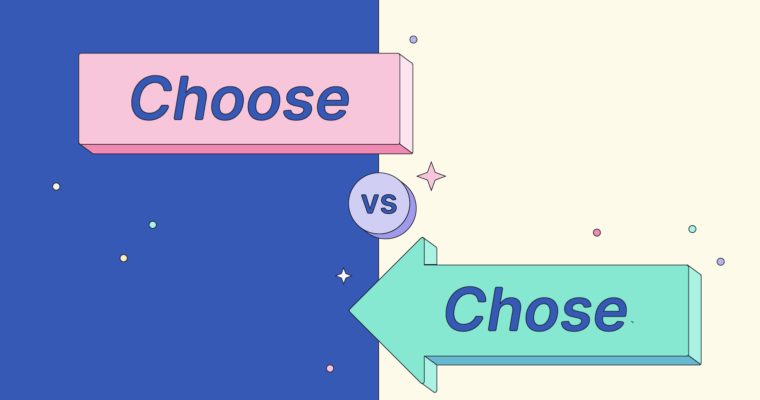
Compared to other commonly confused words, like affect and effect or lose and loose, the rules for using choose vs. chose are much more straightforward. This is because both words have the same meaning—they’re just in different tenses.
Choose is the present tense form of an irregular verb that means “to select something from a group of options or to decide on a course of action,” whereas chose, the past tense of choose, means “to have selected something or decided on a course of action.”
This article will explain the difference between the two and give you examples of when to use choose vs. chose.
When to use choose
The definition of choose is “to pick or select something from two or more options or to decide on a course of action.” Use choose in your writing to describe the action of someone selecting something in the present tense.
Like any verb, choose must always agree with its subject. Choose is used with the first, second, and plural third-person subjects. The simple present tense form of choose is chooses; this form follows singular third-person subjects.
Some teachers choose to talk about banned books in their classrooms.
Pedro chooses to take the scenic route during his commute.
Choose can be used in the future tense when it’s paired with an auxiliary verb, like will or going to.
I’m going to choose a bucket of popcorn at the snack stand.
When to use chose
The definition of chose is “to have selected something or picked from two or more options or made a decision.” Use chose, the simple past tense of choose, to describe when something has been picked or your character has selected a course of action.
Melissa chose to major in chemistry before she was in college.
Choose is an irregular verb, which means it follows different rules for simple past and past participle forms. If choose was a regular verb, its simple past tense would be choosed, and its past participle would be choosen.
The correct past participle of choose is chosen, similar to how the past participle of freeze is frozen. This form is usually used with an auxiliary verb like has or had.
The team has chosen to find a different coach for next season.
Has chosen and have chosen are the present perfect forms of choose and can be used to show that a decision made in the past has continued into the present.
Mona has always chosen the Caesar salad at this restaurant.
Tips for remembering when to use chose vs. choose
An easy way to remember when to use choose over chose is that the present tense choose contains a double o just like soon—so if you choose now, it will happen soon.
You can also remember that choose and present are longer words than chose and past.
Another way to tell the difference is to replace choose or chose with a regular verb and see if it still makes sense. Take the following sentence, for example:
James picked chicken for dinner last night.
We know the events of this sentence took place in the past because picked is a past tense verb; in this case, chose is the better option. Here’s another one:
I pick Olley to be captain of the volleyball team.
This sentence is happening in the present, so choose is the better option here.
Chose vs. Choose examples
Here are two examples of how to use choose correctly and two examples that use choose incorrectly.
Here are two examples of when to use chose in a sentence and two sentences that use it incorrectly.
Chose vs. choose FAQs
When do you use choose?
Choose is a simple present tense irregular verb that means “to pick or select something from two or more options or to decide on a course of action.” Use it to describe someone in the process of making a decision.
When do you use chose?
Chose is the simple past tense form of choose and means that something has been picked or selected from two or more options or that there was a decision. Use it when referring to a decision made in the past.
What are some tips for remembering the difference?
You can replace the word in question with a regular verb, such as pick or select, and see if the sentence still makes sense. You can also remember that if you choose something, it will happen soon.






